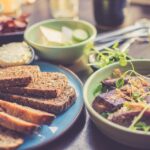Do you feel like you lack energy? Maybe you should start looking into what you eat. A healthy and balanced diet is crucial for everything in our lives. But oftentimes, people get consumed into the marketing of special “supplements,” energy drinks, powders, pills, and the list goes on and on. This happens to the point that we forget to go back to the basics—having a healthy and balanced diet.
Eating healthy is not about doing cleanses, starving ourselves, or even restricting food groups. It is not even about “dieting.” If all this sounds familiar—yet shocking—to you, it’s probably because you may need to start making some changes to your eating lifestyle. A healthy and balanced diet is the solution to more than 90% of health problems, especially energy-related ones.
Keep reading to learn more about the importance of a healthy and balanced diet for energy. But first, let’s get to know more about healthy eating and diet.
What is healthy eating?
Healthy eating means eating a wide variety of foods from each of the 5 major food groups, in the amounts recommended.
Eating a variety of foods from the 5 major food groups provides a range of nutrients to the body, promotes good health and can help reduce the risk of disease – as well as keeping your diet interesting with different flavours and textures.
Many of the foods that often feature regularly in modern diets do not form part of the 5 food groups. These foods, sometimes referred to as ‘junk’ foods, ‘discretionary choices’ or ‘occasional foods’ can be enjoyed sometimes, but should not feature regularly in a healthy diet. Fats and oils are high in kilojoules (energy) but necessary for a healthy diet in small amounts.
No matter where you’re starting, it’s easy to make little changes to bring your eating closer in line with the Australian Dietary Guidelines. Just focus on eating foods from the 5 major food groups and reducing your intake of occasional foods.
5 major food groups
The Australian Guide to Healthy Eating groups the foods that should make up our daily diets into 5 major food groups.
The 5 food groups are:
- vegetables and legumes or beans
- fruit
- lean meats and poultry, fish, eggs, tofu, nuts and seeds, legumes or beans
- grain (cereal) foods, mostly wholegrain or high cereal fibre varieties
- milk, yoghurt, cheese or alternatives, mostly reduced fat.
Foods are grouped together because they provide similar amounts of key nutrients. For example, key nutrients of the milk, yoghurt, cheese and alternatives group include calcium and protein, while the fruit group is a good source of vitamins, especially vitamin C.
Eating a varied, well-balanced diet means eating a variety of foods from each of the 5 food groups daily, in the recommended amounts. Because different foods provide different types and amounts of key nutrients, it is important to choose a variety of foods from within each food group. As a bonus, choosing a variety of foods will help to make your meals interesting, so that you don’t get bored with your diet.
The Importance of a Healthy And Balanced Diet for Energy
1. A Healthy and Balanced Diet Is Key to Boosting Your Metabolism
When you eat healthily, you’re nourishing your body with everything it needs. Your metabolism depends on all the necessary nutrients to be efficient. We all need enough amounts of protein, healthy fat, fiber, vitamins, minerals, and water. Without any of these elements, your body would not perform well. Whether you want to lose body fat or build muscle, you need to have a healthy and balanced diet.
2. It Helps Improve Your Memory and Productivity
Studies show that when you have a healthy and balanced diet, your brain works better. [1] This is because you’re feeding your body with all the right nutrients including omega-3, which enhance memory and productivity. When you feel tired , especially at work or even after eating, it’s most likely because you’ve not been eating well or eating too much over-processed food. Eating healthily will also boost your creativity and make your ideas flow better.
3. It Helps You Have a Healthy Weight
This seems like a no-brainer, but again, common “dieting” trends have made people obsessed with extremes to achieve a healthy weight. You don’t have to do any “fad diets” to lose weight. [2] There’s no need to break the bank to eat healthily or even spend on expensive supplements. If you want to get a healthy weight, all you need to do is learn how to eat in a balanced, healthy way. Eat more whole foods from all food groups, and stay away from refined, overprocessed foods.
4. It Can Help With Your Fitness Goals
If you’ve been trying to get fit, get toned, and lose some body fat but keep struggling, take a closer look at your diet. Remember that fitness results are based on 80% healthy nutrition and 20% exercise. [3] When you eat healthily, your energy levels increase and so does your whole body composition. The first thing you need to focus on—before your weight—is improving your energy and metabolism, and the best way to achieve these is with balanced nutrition.
5. It Helps Improve Your Immune System
The thing about having more energy as your diet improves is that it directly affects your immune system as well. When you eat healthier food, you start feeling more energized and getting sick less often. Personally, I’ve experienced more wellness, and I hardly ever get sick. This includes the infamous flu. One of the best things is seeing how your body changes and that you don’t have to depend on medications or shots to stay healthy. If you’re looking to improve your immune system naturally, many foods can help boost your immune system. [4]
6. It Can Help Save You From Unhealthy Food Cravings
Having a healthy and balanced diet helps reduce food cravings, especially sugar. Eating in a balanced way means that you’re including enough protein and fiber at each meal. Increasing protein in your diet is important not only to increase your energy and boost your metabolism but also to control cravings. Protein is actually the most satiating nutrient, besides fiber. [5] Having healthy fat foods like oils, nuts, seeds, and fruits like avocado will also help keep your blood sugar in check, reduce cravings and increase your energy. [6]
7. It Will Help You Save Money
If you have been spending tons of money on energy drinks to stack up for the day yet still feel awkward, then it’s time to change your eating habits. When you eat in a balanced way that embraces all food groups (AKA colorful plate), then your energy levels will increase. You won’t need to keep buying any more energy drinks or rely on coffee to boost your vitality. Always start with a great breakfast. Starting your day with a balanced meal is the best way to fuel up your body with all the energy you need. Quality whole foods are less expensive than investing in energy drinks and caffeine. By doing this simple change, you’ll notice a significant improvement in your budget.
8. It Can Help You Have Better Mood
Have you noticed how you have constant mood swings when your diet is full of junk food? Well, this has to do with the lack of essential nutrients and the excess of sugar, sodium, saturated fats, and additives. All these substances, especially refined sugars, cause your body to have constant energy crashes. [7] This is the reason why you often feel miserable and tired throughout the day. Start with an easy change, such as including more fruits and veggies, even in your snacks.
9. More Energy Means Better Workout Performance
When you’re heading to the gym, the first thing you usually think about to boost your energy is getting that supplement, those amino acids, or pre-workout shake mix. This is not altogether bad, but did you know that the quality of your diet throughout the day matters more than what you take during workouts? Yes, it’s the foods that we eat during the entire day that will make a huge difference. Therefore, instead of putting all the emphasis on your pre and post-workout snacks only, focus on eating quality meals throughout the day.
Also, don’t rely on workouts to increase your energy. Remember that exercise is only a component of the whole package, so eat healthier meals, and train according to your goals. When you eat right, your energy levels will increase, which means that you won’t feel unnecessarily exhausted after working out.
10. It Can Help Enhance Your Sex Drive
Sexual health is often overlooked when touching on this topic about eating healthy. But besides the common myths and noise about the aphrodisiac foods that can improve your sex life, a healthy and balanced diet can actually impact your sex drive. [8] A healthier diet leads to a healthier body, thus more vitality to perform well in bed. So, if you need to spark up your energy during sex, start by making healthier food choices overall.
Change the way you think about food
There are lots of myths about healthy food. Don’t make food choices based on false beliefs. Some things to try include:
- Don’t think that your diet must be ‘all or nothing’. Eating well doesn’t mean you must worry about eating healthily all the time. A good diet allows for treats occasionally.
- Compare the prices of junk foods against the price of healthier food options to see that ‘healthy’ doesn’t have to mean ‘expensive’.
- Experiment with different foods and recipes. A meal cooked with fresh ingredients is better than a limp burger or soggy chips.
- Try different ‘fast’ options like whole-wheat breakfast cereal, muesli, wholemeal bread, wholegrain muffins, fruit, yoghurt or pasta.
- When eating out, look for kilojoule labelling on menus and check before you choose. A single energy-dense meal may contain most of an adult’s daily kilojoule intake, and drinks can be high in kilojoules too.
- Don’t give up your favourite meals entirely. Try thinking of new ways to create healthy meals – for example, you could make recipes lower in fat by changing the cooking method – grill, stir-fry, bake, boil or microwave, instead of deep frying.
- Reduce the size of your meal or food instead of giving it up entirely. More doesn’t always mean better.
- If you’re worried about missing out on socialising, instead of meeting friends for food, perhaps go for a walk instead. Or you could suggest a food outlet that serves healthier foods, such as wholemeal rolls with vegetable fillings, or sushi.
Stock your food cupboard and fridge
Stock your food cupboard and fridge with ingredients that are quick to prepare and easy to cook.
Meal suggestions include:
- Soups – easy to make and nutritious, especially if you add lots of vegetables, beans or lentils. You can use canned tomatoes and ready-made (low salt) stock as a base and add your own herbs, spices and leftovers.
- Pasta – quick and easy to prepare. Keep tins of tomatoes in your cupboard and add your own variations and flavours.
- Rice – try making fried rice or risotto, or mix cooked rice with leftover vegetables and meat.
- Beans and lentils – canned varieties can make a quick and nutritious addition to soups and stews. Lentils and beans can be used as a main meal with vegetables added.
- Vegetables and fruit – make vegetable curries, stir-fries and vegetable patties and soups. Canned and frozen vegetables can easily be added to last minute meals. Fruit is good for a quick nutritious snack.
- Meat and fish – tinned tuna is a great cupboard stand-by. Shop for cheap cuts of meat for slow cooking in stews and casseroles.
- Condiments – add flavour and interest to your cooking. Keep a selection of dried herbs, spices, curry powder, vinegars, in your cupboard. Tomato sauce, soy sauce and stock cubes also provide great flavour, but they are high in salt – use them only in small amounts.
Healthy eating on a budget
Healthy doesn’t mean expensive. Here are some ways to save money on food:
- Cook extra for the evening meal so you can use the leftovers for a quick meal the following night or for lunch.
- Cook double the amount then freeze what is left over in meal-size portions.
- Shop at the local markets close to closing time for discounted fruit, vegetable and meat bargains.
- Buy in bulk (it’s usually cheaper) and freeze in smaller portion sizes to use as required.
- Use cheaper cuts of meat for curries and casseroles for long slow cooking, then add extra vegetables and beans to make the meal go further.
- One-pot dishes where you throw everything in together save energy, time, money and washing up.
- Watch out for supermarket specials of staples (rice, pasta, pasta sauces, bread and tinned vegetables) and stock up on them when they are cheap. Bread can be frozen for at least two months, and items such as pasta and rice have a long shelf life.
- Limit takeaway foods – they can be expensive, high in fat, high in salt, low in nutrition, and leave you hungry again a few hours after you eat them.



Leave a Reply